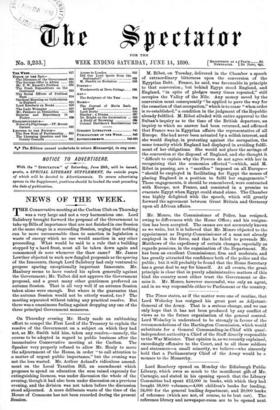M. Ribot, on Tuesday, delivered in the Chamber a speech
of extraordinary bitterness upon the conversion of the Egyptian Debt. France, he said, was favourable in principle to that conversion ; but behind Egypt stood England, and England, "in spite of pledges many times repeated," still occupies the Valley of the Nile. Any money saved by the conversion must consequently " be applied to pave the way for the cessation of that occupation," which is to cease " when order is re-established," a condition in the judgment of the Republic already fulfilled. M. Ribot alluded with entire approval to the Sultan's inquiry as to the time of the British departure, an inquiry to which no answer had been returned, and affirmed that France was in Egyptian affairs the representative of all Europe. She had never been actuated by a selfish interest, and she would display, in protesting against the occupation, the same tenacity which England had displayed in avoiding fulfil- ment of her obligations. She would not place the savings of the conversion at the disposal of England, and she thought it "difficult to explain why the Powers do not agree with her in recognising that the economies effected "—which, said M. Ribot in passing, are a " sacrifice " imposed on all Europe.— " should be employed in facilitating for Egypt the means of placing England in a position to fulfil her engagements." These engagements, it should be remembered, were contracted with Europe, not France, and consisted. in a promise to evacuate Egypt when Egypt could stand alone. The Chamber was highly delighted with the speech, which will greatly forward the agreement between Great Britain and Germany upon all African affairs.




































